Rico Jones carries the weight of multiple musical traditions with remarkable grace. The Colorado-native tenor saxophonist has absorbed influences from his multicultural heritage, tracing his ancestry back to the Manso people who lived from New Mexico to Juarez, Mexico, and simultaneously immersing himself in the African American church tradition that shaped his early musical development. Playing each Sunday in a predominantly Black Catholic church, Jones learned that music could inspire both prayer and community building, a lesson that permeates every note of his latest album, BloodLines.
Released through Giant Step Arts' Modern Masters and New Horizons series, BloodLines represents Jones's New York City leader debut and his most personal artistic statement. Recorded live at Brooklyn's Ornithology in August 2024, the album opens with "Bloodlines: Suite of the Omnipotent and Eternal Spirit," a five-part composition that deliberately uses the preposition "of" rather than "for" to emphasize how each piece functions as part of a larger whole. He aims to create what he calls "a cohesive story" with an emotional arc that follows a film composer’s narrative structure, taking listeners through departure, confrontation, and ultimate victory.
The album showcases Jones's ability to honor multiple musical lineages and establish a distinctive voice. His multicultural background combines Hispanic and Indigenous influences with a deep study of jazz legends like Wayne Shorter and Joe Henderson, creating a unique compositional identity that Vincent Herring calls "one of the few original voices emerging." Jones's career achievements include wins in the Vandoren and Yamaha Emerging Artist Competitions, selection for the Betty Carter Jazz Ahead Program at the Kennedy Center, and collaboration with Esperanza Spalding at both the Mary Lou Williams Jazz Festival and the Blue Note Jazz Club. In 2024, he co-led the first-ever all-Indigenous big band, a project he helped initiate that speaks to his commitment to expanding jazz's cultural representation.
The band on BloodLines embodies what Jones describes as music's inherently cross-generational nature. Jones recruited peer guitarist Max Light, whose "cosmic" tone provides a fresh alternative to the typical piano-led jazz quartet. He also enlisted veteran bassist Joe Martin and drummer Nasheet Waits. This combination creates what he calls "an example of the age-old tradition of multigenerational exchange in the musical arts." The pairing of youthful energy and seasoned wisdom enables Jones to explore compositions that range from the spiritual (“The Voice of God Shines Brightly On My Heart”) to the deeply personal (“Queen Isabelle,” a tribute to his great-grandmother, and “Lone Wolf,” a memorial to a departed friend).
The Spotlight On podcast recently hosted Rico Jones for a wide-ranging conversation. In his interview with host Lawrence Peryer, Jones discussed his decision to structure BloodLines as a suite rather than individual compositions, his relationship with spirituality and improvisation, and how his multicultural heritage informs his approach to storytelling through music.
You can listen to the entire conversation in the Spotlight On player below. The transcript has been edited for flow, length, and clarity.
Lawrence Peryer: I want to start by asking you about some of the specifics around BloodLines. One of the things I'm really curious about is the decision to go with a live album rather than a studio one.
Rico Jones: Well, to be quite frank, that's one of the main focuses that the label, Giant Step Arts, has. All the albums are live. I found it to be a good fit because I felt that the majority of my work is best suited to live performances. I get into a different state, a different performance mindset, when I’m playing for people versus that feeling of, "Okay, now let’s capture some magic in the studio when nobody’s there." In my personal experience as a performer, I have the option, or other members of the band always have the option, as you're recording in the studio, to say, "Oh, wait, wait, wait. Stop, stop. I made a mistake," or "I didn't like what I played." In some ways, that kind of takes that sink-or-swim mentality out of the equation.
Lawrence: The stakes are so different. Could you tell me a little bit about structuring the work as a suite of interconnected pieces? What were you going for as opposed to a collection of separate compositions?
Rico: Ultimately, my goal was to tell a cohesive story or present a coherent narrative with the music. What I mean is simply taking the listener on an emotional journey. For me, my reference point was some of the great film composers.
John Williams is one of the great compositional masters, I believe, of the last fifty years, because all the work he has done in music is so very iconic. When he writes a melody to a film or story, you're able to identify not only the part of the story but the character, the emotional beat. It can bring you to tears just having that music in the background. So I wanted to translate that sort of idea to the realm of improvised music, to jazz, because so often I feel—whether it be my own work or the work of other people—that there's so much passion and so much integrity and so much technical mastery. Still, at the end of the day, it becomes basically a lineup of interesting songs. It's not really saying much, or if it is, it's little vignettes, not necessarily one song connected to the other in an overarching theme.
I wanted to achieve this by creating a suite that, in musical terms, takes on the hero's journey. You have a point of departure, you have an arc, you have a calling to action. You have the confrontation of the shadow, and then victory at the end.
Lawrence: Do you have a Williams score that you return to or that you particularly like?
Rico: It's tough to say. I guess one of the things that made me fall in love with his film scoring in particular was simply the stories that they were tied to. There are many iconic stories. I mean, you talk about Indiana Jones—classic adventure. Star Wars—the space opera. Harry Potter—mystical adventure. I mean, all of these also kind of, in some way, follow that hero's journey narrative.
E.T. in particular has some beautiful stuff. Just the way he can write—it's not even just background sound effects like a lot of film scoring tends to be. It's clear, concise. You can identify it and easily remember it. I suppose a lesser-known fact is that he was also a jazz musician early in his career, which makes sense. You would have to have some masterful skills in improvisation, harmonic, and melodic sensibilities.
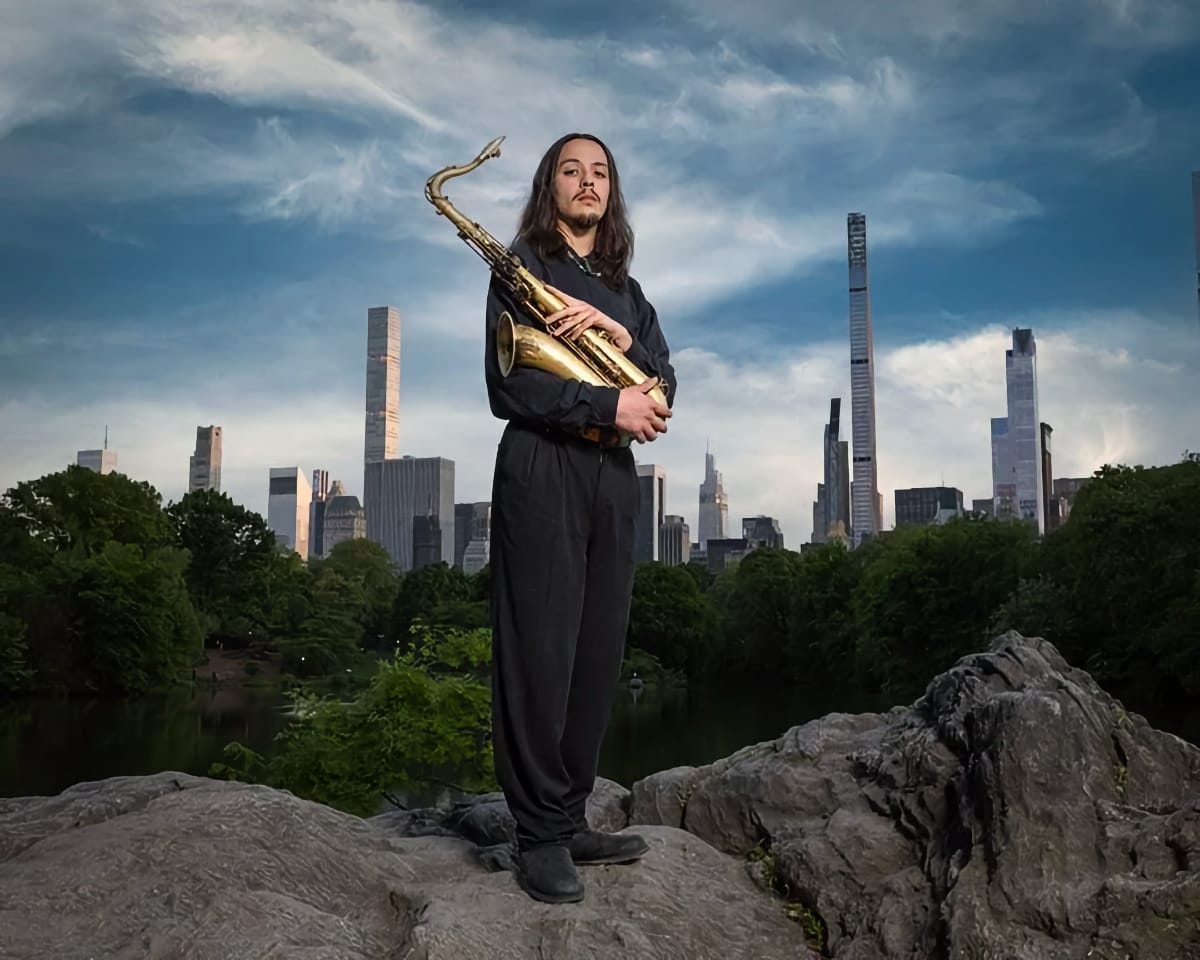
Lawrence: How do the cultural elements in your own personal background impact the storytelling aspect of your music?
Rico: I grew up in a way that exposed me to many different cultural identities. I was in a mixed household, so I had influences with the normal American upbringing that everybody is used to. But I also had Hispanic and Indigenous influences in my family.
It wasn't so overt, to be quite honest with you, because over time, naturally, there was pressure to assimilate into that broader cultural identity—American consumerism or just doing its American thing. But there were lots of Indigenous pottery, artwork on the walls, and woven Mexican blankets. And of course, members of my family would speak Spanish, or my aunts would get together on the holidays, and they'd be making tamales and different things like that. Seeing a Kokopelli on the wall, like that humped flute player. There was always symbolism and subtle hints of it here and there.
Moving forward, I went to an art school starting in the sixth grade. This was a public art school, and it was my mother's idea. I didn't want to leave the school I was used to attending, but it was for the best because it was much more diverse and not overtly religious in any way.
But around the same time, I had an aunt who suggested that we attend a church that she went to, and this was a predominantly Black Catholic church. Upon arriving there, I saw that there was a band—piano, bass and drums, and keyboards, and a full choir. Every Sunday, gospel music would come out, drawn from the Black American church tradition.
I took part in that from a very early age. I was mentored by the musicians there, and I was a part of that community until I left for New York. So all that to say is I've just had a lot of different influences. Not any single experience over those years really put me in a single cultural category, if that makes sense.
I have to say, to me, culture—cultural context—is more important than talking about race. We don't have control over our genealogical backgrounds. We're just living here. There were some times when I was younger when I thought, "Geez, well, I don't really look like the rest of these white kids at the school. I guess everybody thinks I'm ‘other than.'" I had similar feelings growing up with my Hispanic part of my family, the Indigenous part of my family. There would even, at times, be comments about me not being Hispanic enough.
And then, of course, that insecurity when you're entering something like Black American music, a framework like jazz. "I'm not coming from this, but I'm in love with it. I'm 'other than.'" But ultimately, I've just come to terms with the fact that it's a beautiful thing to have a rich collection of influences and to be welcomed in so many different communities. I feel that it's a blessing, whether or not people come to predetermined conclusions about who I am or what my motives are. That's okay. I just try to be as sincere as I can and show as much respect as I can, giving credit where it’s due.
Lawrence: In your experience with the church, there’s an education you must have gotten around the role of music in community and in spirituality.
Rico: Well, sure. By the time I had begun my relationship with the church, I already had an idea that music could be worshipful. But there's something about getting to play the horn, getting to play the saxophone, and being around people hearing beautiful choir music, being moved to tears, or having people move to tears when you're playing and saying, "Wow, you're really playing; you're really praying through the horn." It meant something to me.
Around that time, I became aware of some of those spiritual movements in jazz, namely what John Coltrane was doing, which feels like a surface-level thing to say because I know that his influence is so far-reaching. But those connections felt strong for me because I had not only the abstract or far-off John Coltrane as my hero with A Love Supreme, but I had a clear application for that kind of mindset or that kind of perceived goal, which was taking part in ceremony at church.
If you want to discuss worship or spirituality more universally, I think it’s essential to understand those cultural contexts. What’s important is getting into the subconscious mind and tapping into emotions when you play, allowing yourself to let go completely. I think that many people who don’t subscribe to spiritual belief systems often find it harder to completely let go in the music-making process, to just play with their heart, if that makes sense. I guess the best I can say is spirituality is like attempting to access that subconscious. That's when people say the spirit is moving through you as you play. You're trying to get to a state where the conscious mind is not part of the picture.
Lawrence: Is that where the connection between improvisation and spirituality really lives—in those flow states?
Rico: I would say so. It feels therapeutic to have at least a feeling of letting go of your ego when you're playing music. I tell a lot of folks when I'm playing a concert for them: the beautiful thing about music is that we're able to access experiences and emotions, perhaps tapping into memories that we otherwise wouldn’t get to. That's why it's important that we are present in the moment when we play, either as a listener or as a performer. It is kind of like a form of prayer or meditation.
It can be difficult for us to really be present because, at least in today's day and age, our attention is constantly pulled in different ways with the phone, with the emails, with food, drinks, and socializing. So the meditative practice of focusing in on the music can prove challenging for people.
I compare it to cinematography. I like to call it a cinema of sound, to welcome the audience into my cinema of sound. What I mean is when people buy that ticket to go to the movie, they don't go there to drink a cocktail and talk to their date or scroll through their phone. And if they do, they very might well be removed from the theater. But most of the time, people go there to experience a story. They go there to maybe let go of all of the things that are weighing them down from one day to the next—that pressure about work, the pressure about paying rent, or medical issues, or whatever's going on. They go there to become part of a story that's beyond them.
I feel like it's the same principle when we're listening to instrumental music, but it's more abstract, and you have to maybe look within: "What does this make me think of? Oh, it makes me think about my grandmother, and that's kind of difficult for me. Or it's actually making me really pay attention, and that doesn't make me feel as comfortable as I would be if the story were telling me what to think."
Lawrence: And something I find interesting is when we reach those moments, we have to be careful not to focus on them too much, or they slip away. Can you tell me about your experience of recognizing when, for lack of a better way to say it, you're connecting with the creative spirit? When you're in that moment while performing, do you feel it happening?
Rico: It's tricky because when that happens, it feels like a lapse in time because I'm not conscious of it. It just comes and goes: "Oh, what happened? Wow. That was a really quick concert." I can't control when that takes place, but I suppose I know what inhibits it. And for me, that’s a lack of preparation. It's not about perfection, but if I prepare in such a way that I can go on stage without any questions or doubts, that is what allows me to get into that state more easily. Because a lot of times, insecurity slips in when I feel underprepared. Say I'm playing with a dream-team band, and I'm nervous because I really respect these players. If I'm prepared, I can just let go of that egotistical stuff much easier than if I'm underprepared. My mind's on the page.
When it happens, it's like being in a waking dream because I'm not fully conscious. I mean, the music is happening. There are transcendent moments, but it's almost like my conscious self is in the backseat, and the music—I'm still making some decisions here and there, but it's like split-second things.
Lawrence: I think there's something very Coltrane-esque in that as well—the diligence he put in and the renown he had for practicing. There’s this idea with all great improvisers that they’re so solid on their technique that they can set the technique aside, or transcend the technique. You don't have those worries about, "Can I hit that note?" You just hit it.
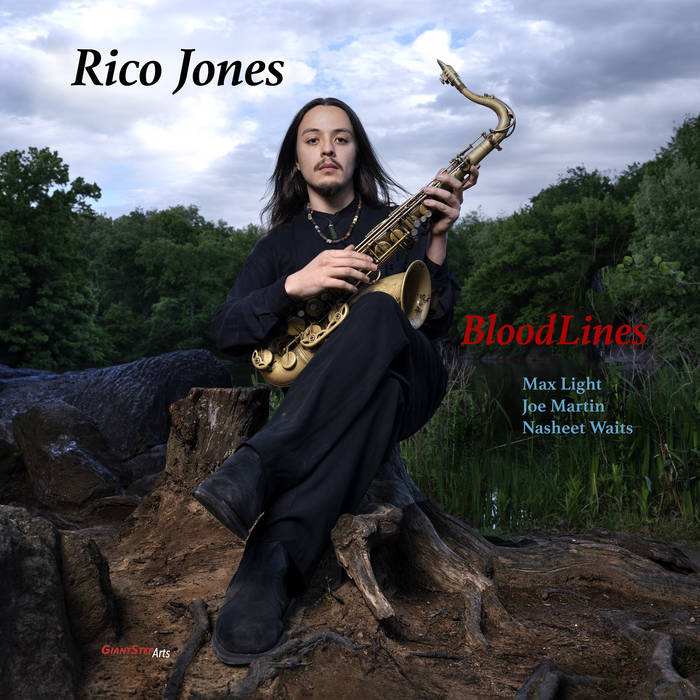
Well, to pivot a little bit: I'm really curious about the collection of musicians on this record. There's an interesting age and experience range. How does this band affect the compositions on BloodLines?
Rico: In terms of Joe Martin, I've been aware of his work for a long time, namely through people that I admired growing up, such as Chris Potter and Mark Turner. He's on a lot of their records. So I grew up listening to Joe Martin's work as part of those different teams. And there was a moment when he came through town with Mark Turner's band, and I spent a while sitting on a couch at Dazzle, this jazz club in Denver, talking to him about life and music. This was a long time ago; I’m not even sure he remembers, but it left a lasting impact on me.
When I was growing up, I was still, I guess, in the realm of make-believe with music. In other words, my heroes were Charlie Parker, Hank Mobley, Stan Getz, and John Coltrane. And I make-believe wanted to be them on the bandstand. They were like my Superman, my Batman, or whatever. I wanted to be like them.
So, as a teenager, I would pick out the older musicians I could find. I figured out how to book gigs at certain venues, and if the budget allowed, I would call on these older musicians. I learned that their music would be at level ten. I might be at level two, but theirs was at level ten, so it brought me up a little bit.
Well, fast-forward: I just began my time in New York City, and, by virtue of a friend of a friend, I was able to get a gig at Birdland. So I thought, "Okay, well, I’ve got to call the dream team. I'm going to call these great musicians." Well, one of them was Joe Martin. So, I reached out to him via email, and he was able to do it; that's when the relationship began. I knew that if I called more experienced players, I would get real-world schooling on the bandstand through osmosis, or they might even give me a tip or two.
It was a similar thing with Nasheet Waits. I had two people kind of reference him to me. The saxophonist Bennie Maupin had been a mentor to me over the years. We speak frequently on the phone, and he said, "Oh, there's this really, really great drummer I love playing with. We are going on tour in Europe. His name is Nasheet Waits. He's amazing."
A couple of years later, I'm in New York, and I call this piano player, David Kikoski. He was giving me a bunch of names: "Hey, you should call this incredible drummer, you should call Nasheet Waits." So I needed to check out Nasheet Waits.
Lawrence: And I love the role of the guitar on this record. Can you tell me a little bit about recruiting Max Light?
Rico: Funny enough, Max and I met in Colorado during the pandemic. He's from Washington, D.C., originally. We are both here in New York now, but I had a friend named Julian Archer, a great drummer, who is also a photographer and videographer. He said, "Man, you should come down to this jam session tonight. I would like to introduce you to this amazing guitarist. You really have to meet him." So I went down; I was at the jam session, and I met Max, and we started a relationship where I would call him for various engagements in Colorado. And he's an astounding musician.
Now, what led me to involve him in BloodLines was a couple of different things, but first and foremost, it was a level of professional trust. Max is the complete opposite of pulling funny stuff. He came incredibly prepared to all the gigs I would call him for. The same is true for the recording session. I mean, he was beyond prepared.
Now, in terms of artistic perspective, one big thing was that the piano is a mainstay in so many iconic jazz records, in contemporary music more so. Yes, you get more guitar, but one could still argue that it’s not used as often as a main comping instrument. It's not the main instrument adding the harmonic color to the palate. And because Max is such a powerful young voice on the scene, I just thought that it would be a great contrast to a lot of the music coming out now, and it would add a different texture and perspective that would make it harder to compare the music to other great saxophonists' records. If it were piano—a more common instrumentation—I think that comparisons could be a lot more within reach. But Max adds such a cosmic and different tone—and he's such a player, man. I’ve got to tell you, even listening back to my recordings of gigs we do, he does so many intricate and intelligent things with the music. I'm astounded every time.
Check out more like this:
 The TonearmLawrence Peryer
The TonearmLawrence Peryer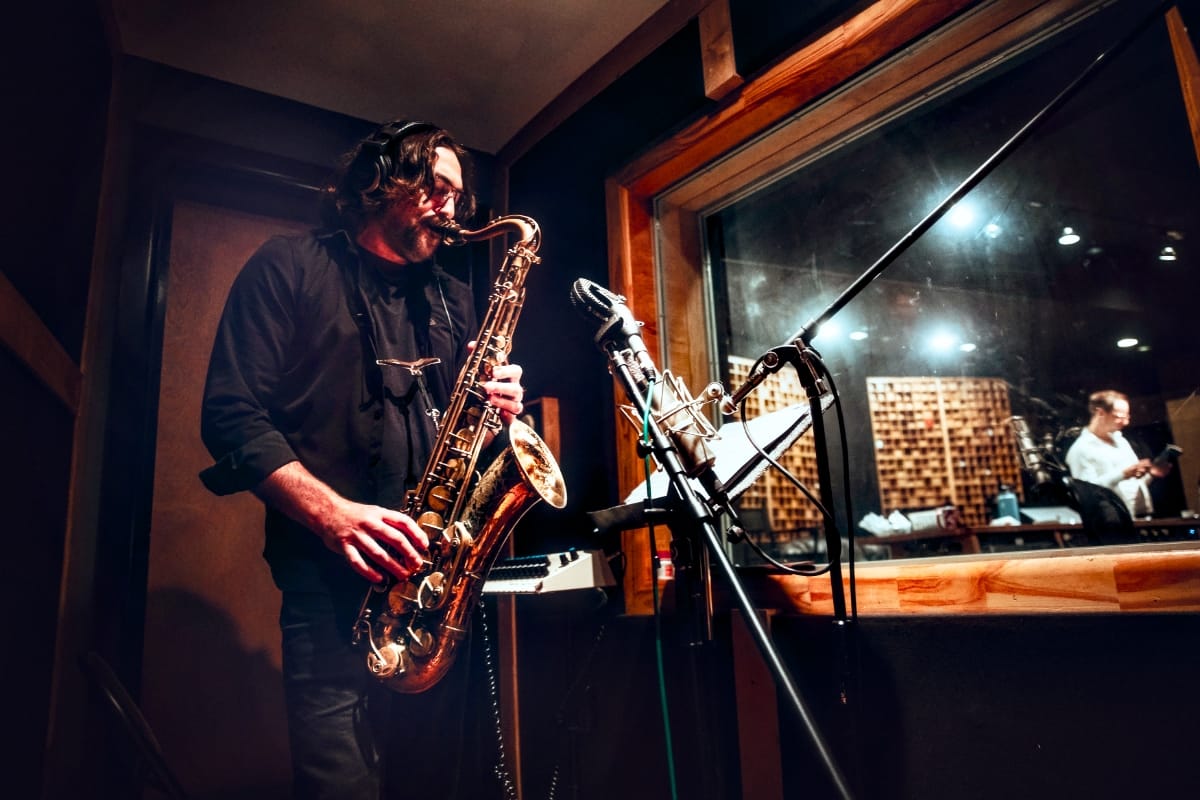
 The TonearmLawrence Peryer
The TonearmLawrence Peryer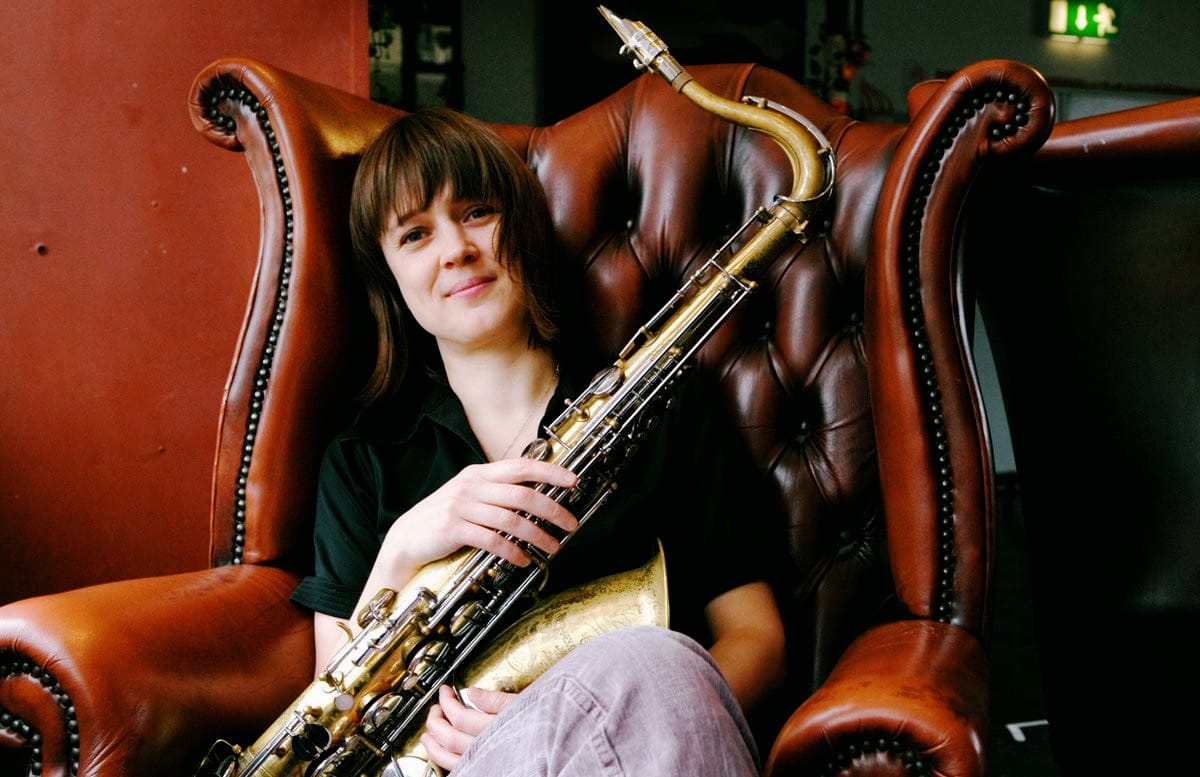


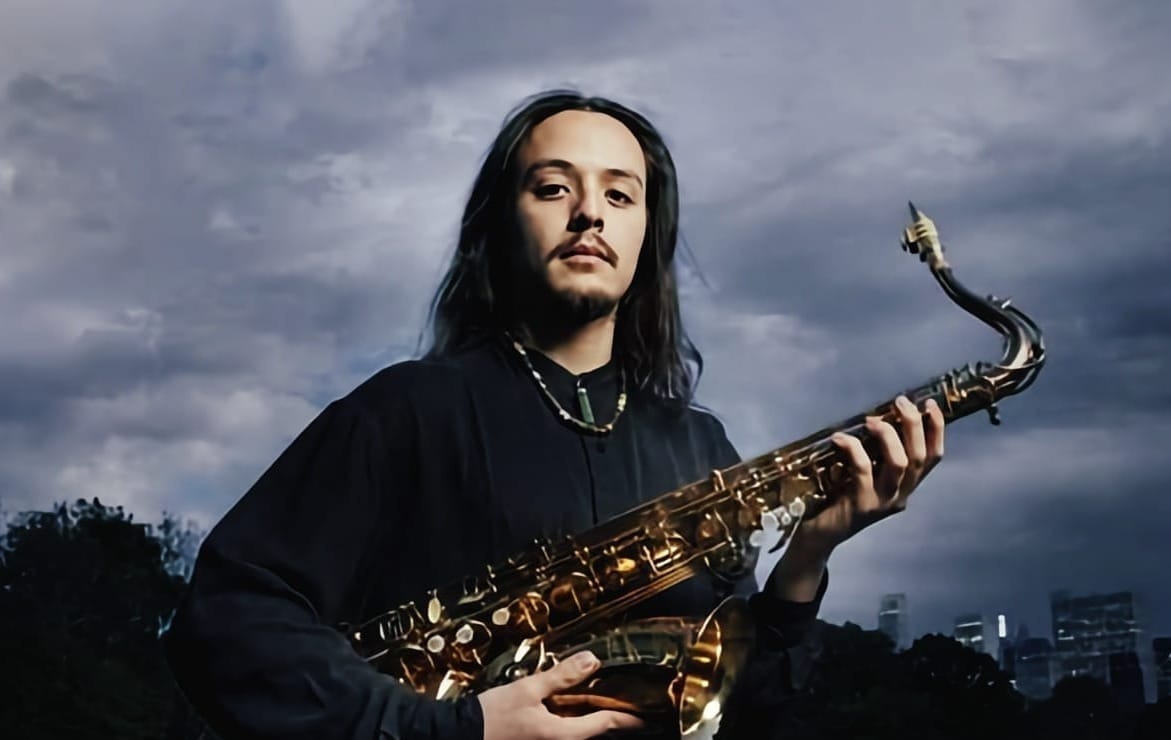

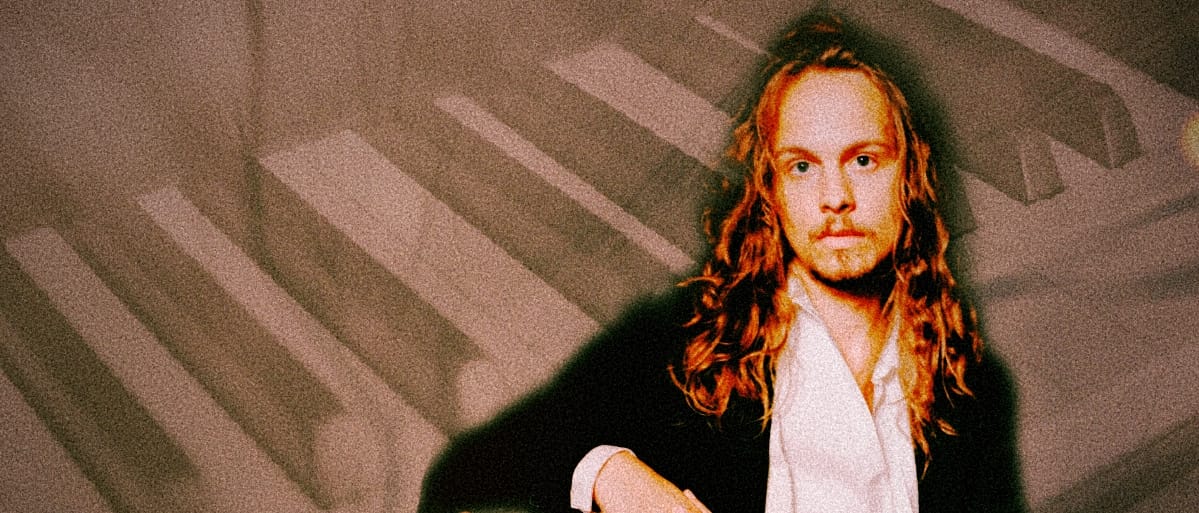
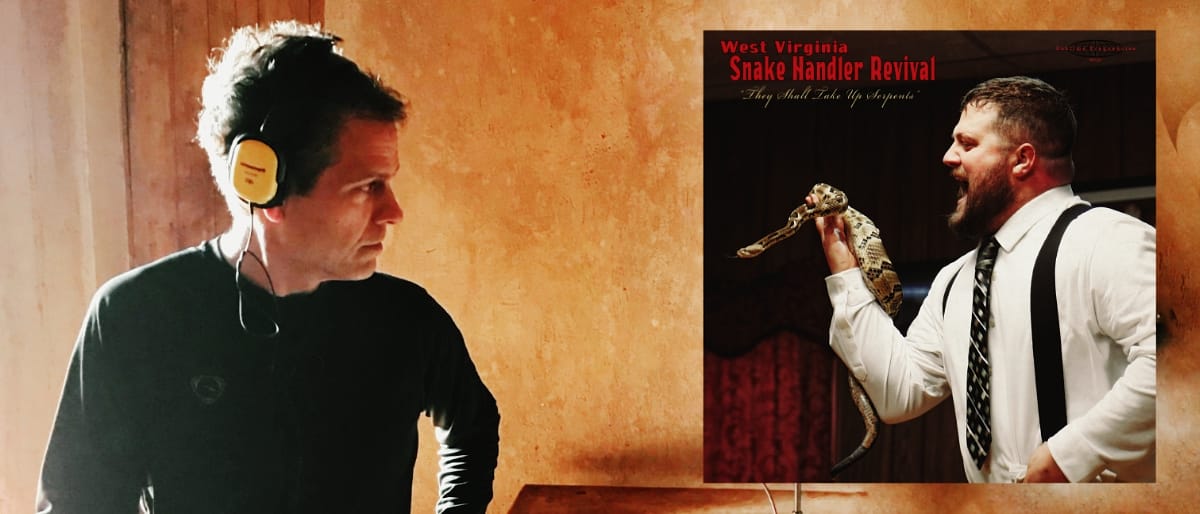
Comments